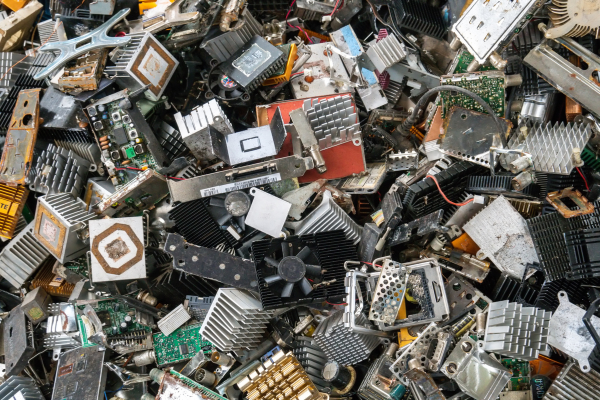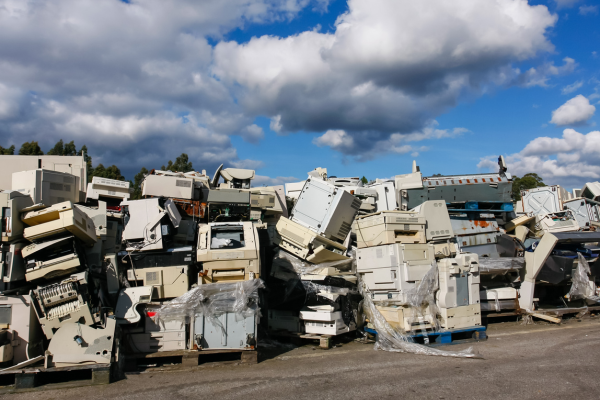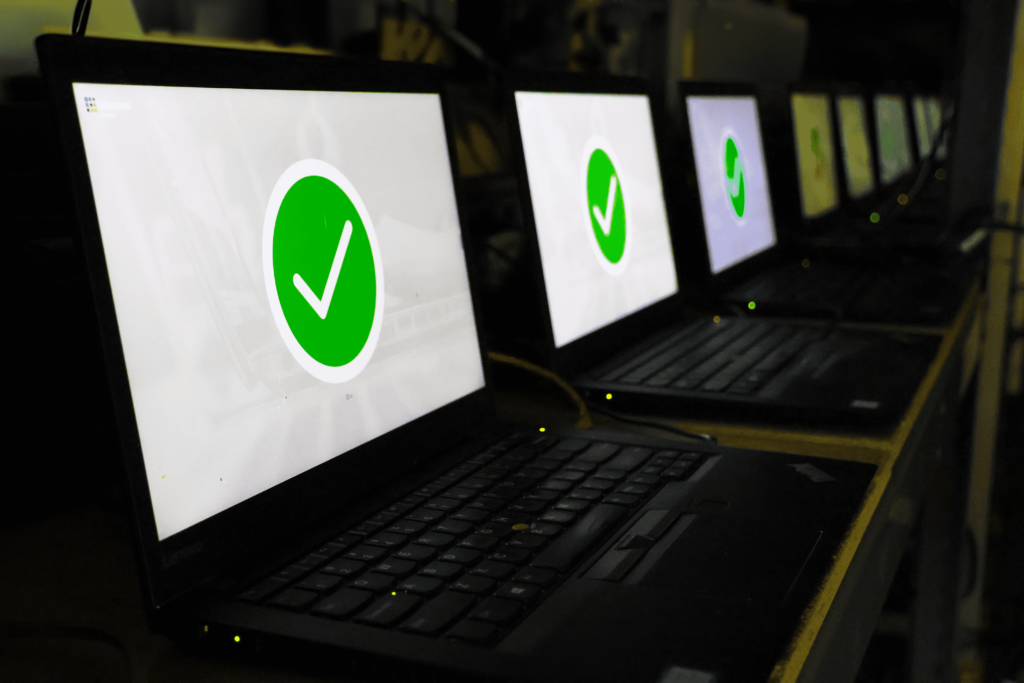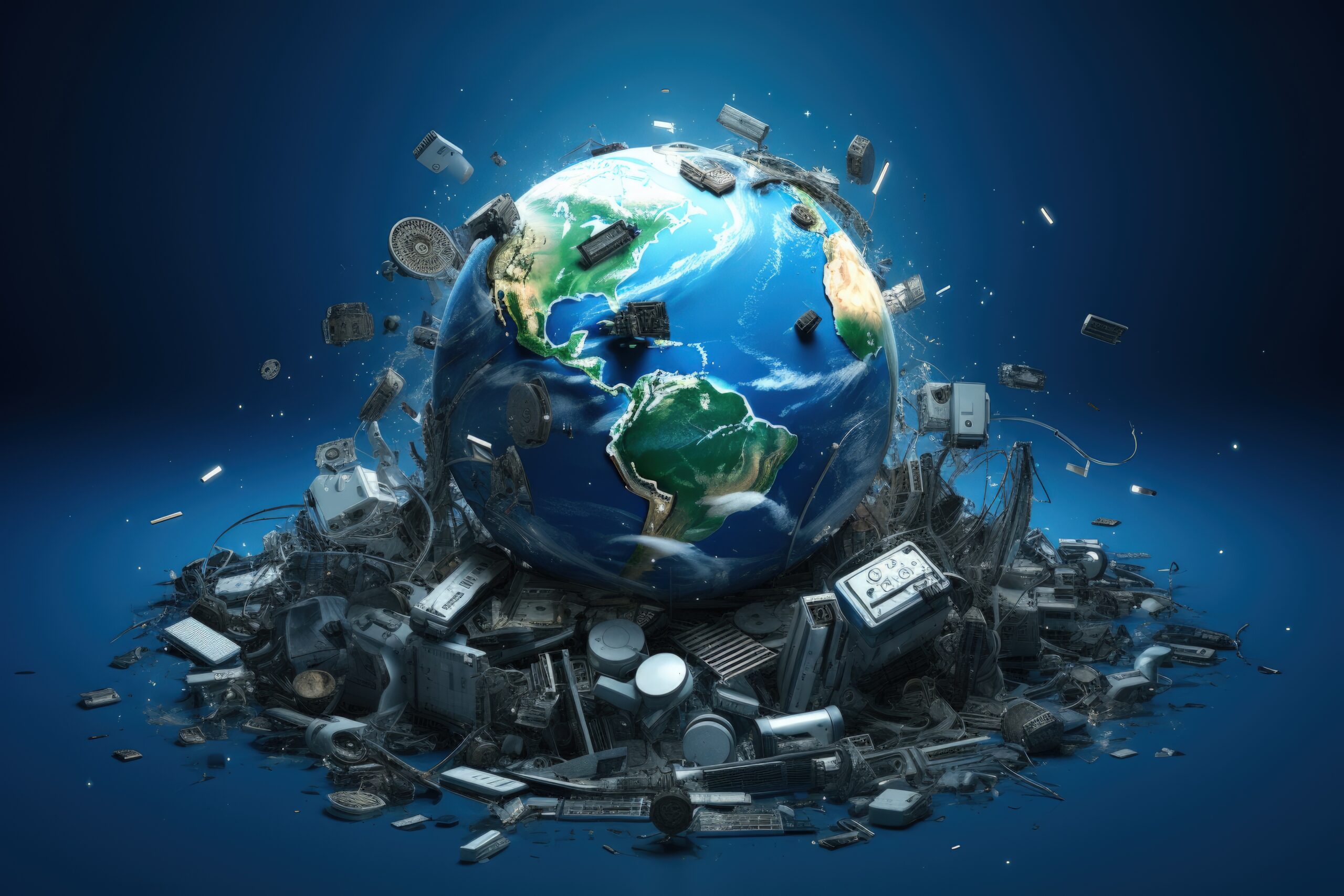Electronic waste (e-waste) is one of the fastest-growing waste streams in the world. With the rapid advancement of technology, old electronics quickly become obsolete, leaving many people wondering, “Can you throw away electronics?” The short answer is no. Proper disposal and recycling of electronics are crucial to prevent environmental harm and recover valuable materials. Understanding why and how to recycle electronics can make a significant difference in minimizing e-waste’s negative impact.
Can You Throw Away Electronics?
What is Electronic Waste?

Definition of E-Waste
Electronic waste, or e-waste, refers to discarded electronic devices and components. This category includes any broken, obsolete, or unused electronics that have reached the end of their life cycle.
Common Types of E-Waste
E-waste encompasses a wide range of items, including:
- Old Phones: Smartphones, feature phones, and landline phones.
- Computers: Desktops, laptops, tablets, and their peripherals.
- TVs and Monitors: CRT, LCD, LED, and plasma screens.
- Home Appliances: Microwaves, toasters, and other small electronic gadgets.
The Environmental Impact of Improper Disposal
Harmful Effects of E-Waste in Landfills

When pondering, “Can you throw away electronics?” it’s important to consider the environmental consequences. E-waste in landfills can release toxic substances into the soil and water. Heavy metals like lead, mercury, and cadmium can leach into the environment, causing significant harm to ecosystems and human health.
Pollution and Toxic Substances Released
E-waste often contains hazardous materials that, if not handled properly, can cause severe pollution. For instance, the burning of electronic components can release harmful chemicals into the air, contributing to air pollution and respiratory issues.
Long-Term Environmental Consequences
The long-term consequences of improper e-waste disposal are far-reaching. Toxic substances from electronics can accumulate in the environment, leading to persistent pollution that affects wildlife and natural resources. Additionally, valuable materials that could be recovered and reused are lost, increasing the demand for new raw materials and further depleting natural resources.
By understanding the importance of recycling and proper disposal of electronics, we can reduce the environmental impact and promote a more sustainable future.
Can You Throw Away Electronics?
Legal and Ethical Considerations
Regulations Regarding E-Waste Disposal
When asking, “Can you throw away electronics?” it’s crucial to understand the legal landscape. Many regions have strict regulations governing e-waste disposal to prevent environmental contamination. For example, the U.S. Environmental Protection Agency (EPA) and various state agencies have established guidelines to ensure safe handling and recycling of electronic waste. Complying with these regulations helps mitigate the negative impact of e-waste on the environment.
The Importance of Complying with Local Laws
Adhering to local e-waste disposal laws is not only a legal obligation but also a responsibility. Non-compliance can lead to hefty fines and legal repercussions. More importantly, following these laws ensures that hazardous materials in electronics are managed properly, protecting both the environment and public health.
Ethical Reasons for Recycling Electronics Properly
Beyond legal requirements, ethical considerations play a significant role in e-waste management. Recycling electronics responsibly prevents harmful substances from entering the ecosystem and supports the ethical use of resources. It also demonstrates a commitment to environmental stewardship and corporate social responsibility.
Can You Throw Away Electronics? Benefits of Recycling Electronics
Recovery of Valuable Materials
One of the key benefits of recycling electronics is the recovery of valuable materials. Electronics contain precious metals like gold, silver, and copper, as well as other reusable components. Recycling these materials reduces the need for mining and conserves natural resources.
Reduction of Environmental Footprint
Proper e-waste recycling significantly reduces the environmental footprint of discarded electronics. By diverting e-waste from landfills, we can prevent the release of toxic substances into the environment, minimizing pollution and its associated health risks.
Contribution to the Circular Economy
Recycling electronics contributes to the circular economy, an economic system aimed at eliminating waste and the continual use of resources. By recycling, we ensure that valuable materials are kept in circulation, reducing the demand for new raw materials and promoting sustainable consumption patterns.
Can You Throw Away Electronics? How Electronics Recycling Works
Overview of the Recycling Process
Understanding the recycling process can answer the question, “Can you throw away electronics?” The process typically starts with the collection of e-waste, followed by sorting and dismantling. Components are then separated based on material type (e.g., metals, plastics) and processed for recovery.
Steps Involved from Collection to Processing
- Collection: E-waste is collected from various sources, including households, businesses, and recycling centers.
- Sorting and Dismantling: Collected items are sorted, and usable components are dismantled.
- Material Recovery: Valuable materials like metals and plastics are extracted and processed for reuse.
- Disposal of Hazardous Waste: Any hazardous materials are safely disposed of following environmental regulations.
The Role of Specialized Recycling Companies
Specialized recycling companies, such as Monmouth Wire Computer Recycling, play a crucial role in the e-waste recycling process. These companies have the expertise and equipment needed to handle e-waste safely and efficiently. They ensure that valuable materials are recovered, hazardous substances are properly managed, and the entire process complies with legal and environmental standards. By partnering with such companies, individuals and businesses can contribute to a more sustainable and responsible approach to electronic waste management.
Secure Data Destruction
Importance of Data Security in Electronic Recycling
When considering, “Can you throw away electronics?” data security is a paramount concern. Electronic devices, particularly computers, smartphones, and tablets, often store sensitive information such as personal data, financial records, and confidential business details. Improper disposal of these devices can lead to data breaches, identity theft, and other security issues. Ensuring secure data destruction is crucial to protect this information from falling into the wrong hands.
Methods for Secure Data Destruction
Several methods can be employed to ensure data is securely destroyed before electronics are recycled. These methods include:
- Data Wiping: This involves overwriting the existing data on a device multiple times to ensure that it cannot be recovered. While effective, it requires specialized software and verification processes to ensure completeness.
- Degaussing: This method uses a strong magnetic field to disrupt the magnetic domains on a hard drive, rendering the data unreadable. It is particularly effective for magnetic storage devices but unsuitable for solid-state drives (SSDs).
- Physical Destruction: Physically destroying the storage medium, such as shredding hard drives or crushing SSDs, ensures that data cannot be recovered. This method is often considered the most secure because it physically eliminates the possibility of data retrieval.
Benefits of Using Professional Services for Data Destruction
Utilizing professional services for data destruction offers several advantages:
- Compliance: Professional data destruction services ensure compliance with data protection laws and regulations, such as GDPR, HIPAA, and others. This is critical for organizations handling sensitive information.
- Security: Professional services use advanced techniques and equipment to guarantee that data is irretrievably destroyed. They also provide certification of destruction, offering peace of mind and proof of compliance.
- Efficiency: Professionals can handle large volumes of electronic devices efficiently, saving time and resources for businesses and individuals.
By prioritizing secure data destruction, you can confidently answer “No” to the question, “Can you throw away electronics?” ensuring that your data remains protected during the recycling process.
Alternatives to Throwing Away Electronics

Reuse and Donation Options
Instead of wondering, “Can you throw away electronics?” consider the benefits of reuse and donation. Many electronic devices still have useful life left in them, even if they are no longer needed by their current owner. Donating these devices to schools, non-profits, or community organizations can provide valuable resources to those in need while keeping electronics out of landfills.
Monmouth Wire Computer Recycling offers services to facilitate the reuse and donation of electronics. They ensure that devices are refurbished and provided to organizations that can benefit from them, extending the life cycle of these devices and reducing environmental impact.
Repurposing Old Electronics
Repurposing old electronics is another excellent alternative to disposal. With a bit of creativity, you can find new uses for outdated devices, extending their useful life and reducing waste.
- Home Projects: Old smartphones can be repurposed as security cameras, media players, or even digital photo frames. Cell phone repairs are an option for reselling and or trading in a phone.
- DIY Projects: Electronics enthusiasts can use components from old devices for DIY projects, creating everything from custom electronics to art installations.
- Upcycling: Upcycling involves transforming old electronics into entirely new products, such as turning an old computer monitor into a pet bed or a lamp.
By exploring these alternatives, you can effectively answer, “Can you throw away electronics?” with a resounding “No,” opting instead for reuse, donation, or repurposing to benefit both the environment and the community.
Recap the Importance of Proper E-Waste Disposal
In conclusion, the question “Can you throw away electronics?” has a clear and compelling answer: No. Proper e-waste disposal is crucial for protecting the environment, conserving resources, and safeguarding data security. Improper disposal of electronics leads to pollution, health hazards, and the loss of valuable materials that could be recycled and reused.
Take Action and Recycle Electronics Responsibly
Taking action to recycle electronics responsibly is not just a legal obligation but an ethical one. By recycling, reusing, or repurposing old electronics, we can significantly reduce the negative impact of e-waste. It’s important to be proactive in finding ways to dispose of electronics properly, whether through professional recycling services, donating to those in need, or repurposing items creatively.
How to Contact Monmouth Wire Computer Recycling for Recycling Services
For those looking to dispose of their electronics responsibly, Monmouth Wire Computer Recycling offers comprehensive recycling services. They specialize in secure data destruction, electronics recycling, and facilitating the reuse and donation of electronic devices. By partnering with Monmouth Wire Computer Recycling, you can ensure that your e-waste is handled in an environmentally friendly and secure manner.
Contact Information
- Website: Computer Reclamation
- Phone: 732-922-3320

